Book contents
- Frontmatter
- An Obligation to Shakespeare and the Public
- Our Closeness to Shakespeare
- The Popularity of Shakespeare: An Examination of the Royal Shakespeare Theatre’s Repertory
- Shakespeare and the Fashion of These Times
- An Approach to Shakespearian Tragedy: The ‘Actor’ Image in Macbeth
- Shakespeare’s Impact Today in France
- Shakespeare and the Modern World
- Modern ‘Theatrical’ Translations of Shakespeare
- Shakespeare as ‘Corrupter of Words’
- Shakespeare in Ghana
- ‘Timon of Athens’
- Who Strutted and Bellowed?
- Shakespeare in Planché’s Extravaganzas
- ‘Our Will Shakespeare’ and Lope de Vega: An Unrecorded Contemporary Document
- Shakespeare and the Mask
- International Notes
- Shakespeare Productions in the United Kingdom: 1961
- Acting Shakespeare Today. A review of performances at the Royal Shakespeare Theatre, August 1962
- Canada’s Achievement
- 1 Critical Studies
- 2 Shakespeare’s Life, Times and Stage
- 3 Textual Studies
- Books Received
- Index
- Plate section
Shakespeare’s Impact Today in France
Published online by Cambridge University Press: 28 March 2007
- Frontmatter
- An Obligation to Shakespeare and the Public
- Our Closeness to Shakespeare
- The Popularity of Shakespeare: An Examination of the Royal Shakespeare Theatre’s Repertory
- Shakespeare and the Fashion of These Times
- An Approach to Shakespearian Tragedy: The ‘Actor’ Image in Macbeth
- Shakespeare’s Impact Today in France
- Shakespeare and the Modern World
- Modern ‘Theatrical’ Translations of Shakespeare
- Shakespeare as ‘Corrupter of Words’
- Shakespeare in Ghana
- ‘Timon of Athens’
- Who Strutted and Bellowed?
- Shakespeare in Planché’s Extravaganzas
- ‘Our Will Shakespeare’ and Lope de Vega: An Unrecorded Contemporary Document
- Shakespeare and the Mask
- International Notes
- Shakespeare Productions in the United Kingdom: 1961
- Acting Shakespeare Today. A review of performances at the Royal Shakespeare Theatre, August 1962
- Canada’s Achievement
- 1 Critical Studies
- 2 Shakespeare’s Life, Times and Stage
- 3 Textual Studies
- Books Received
- Index
- Plate section
Summary
Impact—this, to me, suggests a missile hitting its target. And indeed, there was a time when the term was quite appropriate. The English actors who gave Othello in Paris soon after the battle of Waterloo were soundly booed, for reasons which were not altogether artistic or literary. The attempt was obviously premature. Yet the name of Shakespeare was already well known in France, even if his works had been sadly defaced and misunderstood during the eighteenth century. On our own classical age he seems to have had little influence. It is true that we sometimes seem to hear echoes of his thought and of his poetry in the plays of such writers as Montfleury or Tristan L’Hermite, the latter of whom had visited England twice and whose Folie du Sage is so strangely reminiscent both of Hamlet and of Romeo and Juliet. Those baroque playwrights have not so far received their due from the critics. As Léon Chancerel recently pointed out in a series of broadcasts very properly entitled Shakespeare et nous, all Tristan’s plays have a Shakespearian manner: the general outlook, the sense of, and taste for, action, the feeling for humanity and the truth, as well as the outspoken vigour of the dialogue are features which do not surprise us nowadays, but of which seventeenth-century audiences were taught to disapprove. The rigid discipline of classical art could not accept the vigorous liberty of Elizabethan dramatists. And yet it would not be true to say that even during the seventeenth century Shakespeare’s name and works were totally unknown in France: there was one copy of his works in the library of Louis XIV, and another in Fouquet’s.
- Type
- Chapter
- Information
- Shakespeare Survey , pp. 53 - 56Publisher: Cambridge University PressPrint publication year: 1963

